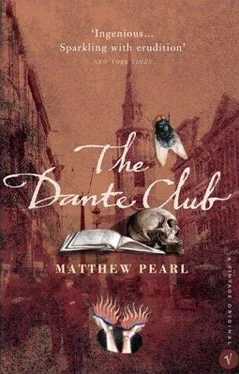The earth was hot and dry when Company C of the 10th Regiment was sent from Boston to Springfield to Camp Brightwood. Dust clouds crusted the soldiers’ new blue uniforms so completely as to make them the same dull gray color of the enemy’s. The colonel asked if Benjamin Galvin wished to be the company adjutant and record casualty lists. Galvin explained that he could write out his alphabet but could not write or read correctly; he had tried learning many times, but the letters and marks got tangled up in the wrong direction in his head and crashed and turned into each other on the page. The colonel was surprised. Illiteracy was not at all unusual among the recruits, but Private Galvin always seemed to be in such deep thought, taking in everything with such big, quiet eyes and a completely still expression, that some of the men had called him Possum.
When they were encamped in Virginia, the first excitement came when a soldier from their ranks was found in the woods one day, shot in the head and bayoneted, maggots filling his head and mouth like a swarm of bees settling on their hive. It was said that the Rebels had sent one of their blacks over to kill a Yank for amusement. Captain Kingsley, a friend of the dead soldier’s, made Galvin and the men swear no sympathy when the day came to whip the Secesh. It seemed they would never have the chance to engage in the combat all men itched for.
Galvin, though he had worked outdoors most of his life, had never seen the sorts of creeping things that filled this part of the country. The company adjutant, who woke an hour before bugle each morning to comb his thick hair and record lists of the sick and the dead, would let no one kill one of these crawling creatures; he cared for them like children even though Galvin saw, with his own eyes, four men from another company die from the white worms that infested their wounds. This happened while Company C marched to the next camp—nearer, it was rumored, to a live battleground.
Galvin had never imagined that death could come so easily to people around him. At Fair Oaks, in a single burst of noise and smoke, six men would lie dead before him, their eyes still staring as though with interest in what would come for the rest. It was not the number of dead but the number of men who survived that day that was a great wonder to Galvin, as it did not seem possible, or even right, for a man to live through. The inconceivable number of dead bodies and dead horses were collected together like cordwood and burned. Every time Galvin closed his eyes to sleep after that, he could hear shouts and explosions inside his spinning head, and could permanently smell the odor of ruined flesh.
One evening, returning to his tent with a ravenous pang, Galvin found a portion of his hardtack missing from his sack. One of his tentmates said he had seen the company chaplain take it. Galvin did not believe such wickedness possible, for all of them had the same gnawing hunger and same empty stomach. But it was hard to blame a man. When the company was marching through pouring rain or blazing heat, the rations inevitably diminished to only crackers infested with weevils, and not nearly enough of them, either. Worse than anything, a soldier could not stop for a night without “skirmishing,” stripping off his clothes and digging out the bugs and ticks. The adjutant, who seemed to know about these things, said the way the insects got on them was when they stood still, so they should keep moving ahead always, always moving.
Wriggling creatures also populated the drinking water, a result of dead horses and rotten meat sometimes piled up into fords by soldiers. From malaria to dysentery, all maladies were known as camp fever, and the surgeon could not distinguish between the sick and the pretenders, and so usually thought it best to assume one belonged with the latter. Galvin once vomited eight times in one day, bringing up nothing but blood the final time. Every few minutes while he was waiting for the surgeon, who put him on quinine and opium, the surgeons would throw an arm or leg out the window of the makeshift hospital.
When they were encamped, there was always disease, but at least there were also books. The assistant surgeon collected the ones that were sent to the boys from home to keep in his tent, and he acted as librarian. Some of the books had illustrations that Galvin liked to look at, other times the adjutant or one of Galvin’s tentmates would read a story or poem aloud. Galvin found in the assistant surgeon’s library a shiny blue-and-gold copy of Longfellow’s poetry. Galvin could not read the name on the cover, but recognized the engraved portrait on the frontispiece from one of his wife’s books. Harriet Galvin always said that each of Longfellow’s books found a way to light and happiness for its characters when they were faced with hopeless paths, like Evangeline and her beau, separated in their new country only to find each other when he was dying of fever and she was a nurse. Galvin imagined that was him and Harriet, and it reassured him as he watched men drop all around him.
When Benjamin Galvin first came from his aunt’s farm to help the abolitionists in Boston after hearing a traveling lyceum speaker, he was knocked out by two hollering Irishmen who were trying to break up the abolitionist meeting. One of the organizers took Galvin home to recover, and Harriet, a daughter of this organizer, fell in love with the poor boy. She had never met anyone, even among her father’s friends, so simply certain of the rightness and wrongness of things without a corrupting concern for politics or influence. “Sometimes I think you love your mission more than you can love other people,” she said while they were courting, but he was too forthright to think of what he did as a mission.
She was heartbroken to hear from Galvin how his parents had died of the black fever when he was young. She taught him to write his alphabet by making him copy it out on slates; he already knew how to write his name. The day he decided to volunteer to fight the war, they married. She promised to teach him enough to read a whole book on his own when he returned from the war. That was why, she said, he must come back alive. Galvin would crawl under his blanket, lying on his hard board, thinking of her steady, musical voice.
When shelling began, some of the men would laugh uncontrollably or shriek as they fired, their faces blackened by the powder from tearing open cartridges with their teeth. Others would load and fire without aiming, and Galvin thought these men truly insane. The deafening cannons thundered across the earth so terribly that rabbits fled their holes, their little bodies trembling with fright as they hopped across the dead men sprawled all over the ground, which steamed with blood.
Survivors rarely had strength left to dig sufficient graves for their comrades, resulting in entire landscapes of protruding knees and arms and the tops of heads. The first rain would uncover all of it. Galvin watched his tent-mates scribble letters home telling of their battles, and he wondered how they could put to words what they had seen and heard and felt, for it was beyond all words he had ever heard. According to one soldier, the arrival of support lines for their last battle, which had massacred nearly a third of their company, had been called off on the orders of a general who wished to embarrass General Burnside in hopes of securing his removal. The general later received a promotion.
“Is it possible?” Private Galvin demanded of a sergeant from another company.
“Two mules and another soldier killed,” Sergeant LeRoy chuckled gruffly to the still-green private.
The campaign would prove only second in horrors and human flesh to Napoleon’s Russian campaign, the bookish adjutant warned Benjamin Galvin sagaciously.
Читать дальше












